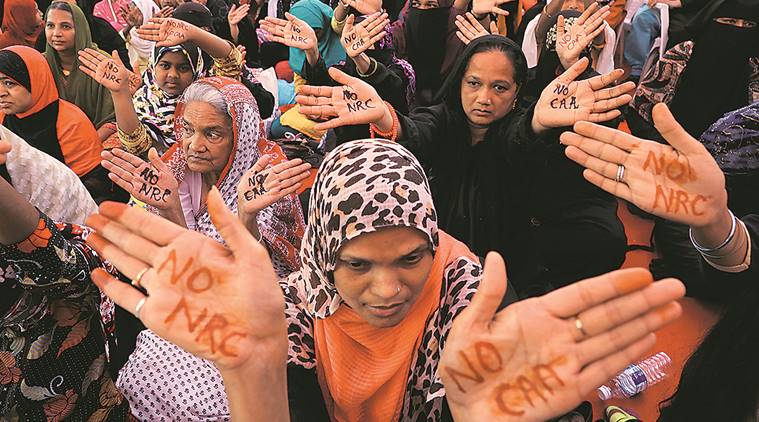 Women protesting against the Citizenship Amendment Act at Shaheen Bagh.(Express Photo)
Women protesting against the Citizenship Amendment Act at Shaheen Bagh.(Express Photo)
The Shaheen Bagh/Jasola Vihar Metro Station falls on my route to work. In the past two months, every time I have heard the name announced on the train, I have squirmed on my seat. And the three times I have been there, proclaiming my visits loudly, I have come back a little ashamed.
And, relieved. That I reside on the right side of the drain that divides Shaheen Bagh from upscale Jasola Vihar — the distinction clearly marked by that double name for the Metro station. That I belong to the right religion. That the Citizenship (Amendment) Act is just an unwieldy acronym for me. That I am not watching over my shoulder for everything from a bulldozer to a country-made gun, even inflections in a speech. That it’s not me sitting out there in the cold. That I am not the mother fielding disapproving questions about a lost baby.
These days, I also ask myself another question. Now that the drum beats of the election battle have died, how long will our interest in this remarkable montage of women gathered under a tent, in a kaleidoscope of colours and voices, last?
In these narrow lanes, how long will linger those spontaneous cries of azadi? How long before they pull down the posters covering every inch of space? Remove those stone blocks on the road where, on one cold night, a mother gathered her children around a fire lit using scrap as I watched from the shadows? Dismantle the langars that sustained them and many others? Shoo away the vendor selling Tricolour flags, caps, T-shirts; and another painting cheeks, in orange, white and green, in a display of patriotism as defiant as desperate?
When they come to “clear the road”, what will they do with the India map made of scrap and beautified with fairy lights in what can only be a labour of love, the books on the Constitution in the ‘library’ at the bus stop, or the artwork covering the street? What happens to that man playing songs of protest from a device perched on a bicycle? What happens to those songs even?
And, will they leave the stage, which seemed for a while big enough to accommodate a nation, its causes small and large, some familiar and some foreign, for the last? Will the women keep trickling in still, and for how long? Or will they disappear as unexpectedly as they came? To where? And, will I go looking?
Whatever happens though, the ‘termites’ we won’t see have done the job we won’t — laid bare our hollow democracy. Where a government with 303 seats is shaken by a small space; and boys with guns are set upon mothers with small children.
Like the termites which come in 2,000-plus species, we have failed to box them into any type. They wear the hijab, and frequent the local gym. Their mosque stands next to the protest site, as does an IVF clinic, “the largest in the country”. Their children go to madrasas, and also to English-speaking centres located round every corner.
Still, isn’t it a relief that the ‘termites’ stay where they are, hidden away? Relegated to one side of that reeking nullah, kept firmly away by a shiny steel footbridge, with a passing Metro’s reflection offering glimpses of the Capital they are a part of. And inhabiting quietly a colony whose name means ‘Falcon Garden’, where the only hint of a park is a strip of land marked by dusty swings, where falcons only linger as a euphemism for the kites hovering over putrefied slush, which doesn’t get potable water, where the shadows of Babri Masjid demolition never went away, and where unsteady buildings must accommodate the weight of their ambitions.
Dont Miss| Of Gandhian frames
Think of what would happen if they all came out instead, and demanded citizenship that went beyond name on a list. Like the right to live on our side, the right to water, sanitation, health, to streets not overwhelmed with waste and the odour of urine. To a government that would respond if someone sat on the road for two months. To be counted as more than a traffic inconvenience. To have their infants mourned than become political football. To take their quest for democracy further, to entire corners of the country dubbed anti-national.
And to matter more than a pilgrimage site where people like us come to do our bit, before returning to our safe havens — a point raised by my college-going son who declined to be a part of this, and for which I had no answer. He also tells me that he and his friends have no doubt that up ahead in their hands is a world far different from ours.
There is another factoid about termites it will bode us well to remember. They have been around since the time of the dinosaurs. Isn’t it a comforting thought then that all Shaheen Bagh ultimately wants, from a country that has given it little, is the right to be ‘citizens’?
Meanwhile, in as much time as it takes to read these lines, over at Shaheen Bagh, a group has crowded into a cage meant to resemble a detention camp — the very same camps we have relabelled and insist don’t exist. They jostle inside, smile through the bars and pose for selfies.
And just like that, it’s they who are free.
This article first appeared in the February 16 print edition titled ‘Shaheen Bagh, from my safe distance’. National Editor Shalini Langer curates the fortnightly ‘She Said’ column